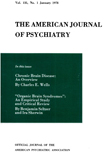Schizophrenia: affect and outcome
Abstract
Considerable data suggest that schizophrenic patients with affective symptoms have a more favorable outcome than other schizophrenic patients. This may indicate that such patients are more validly regarded as having either an affective disorder or a schizoaffective psychosis. Studies of this issue have suffered from significant methodologic problems, including inappropriate sampling, unsystematic collection of symptom data, unreliable diagnostic procedures, and restricted outcome assessment. The present study, designed to surmount these methodologic difficulties, indicates that while levels of psychotic symptoms in schizophrenic patients correlate with poor outcome, affective symptoms have little prognostic power.
Access content
To read the fulltext, please use one of the options below to sign in or purchase access.- Personal login
- Institutional Login
- Sign in via OpenAthens
- Register for access
-
Please login/register if you wish to pair your device and check access availability.
Not a subscriber?
PsychiatryOnline subscription options offer access to the DSM-5 library, books, journals, CME, and patient resources. This all-in-one virtual library provides psychiatrists and mental health professionals with key resources for diagnosis, treatment, research, and professional development.
Need more help? PsychiatryOnline Customer Service may be reached by emailing [email protected] or by calling 800-368-5777 (in the U.S.) or 703-907-7322 (outside the U.S.).



